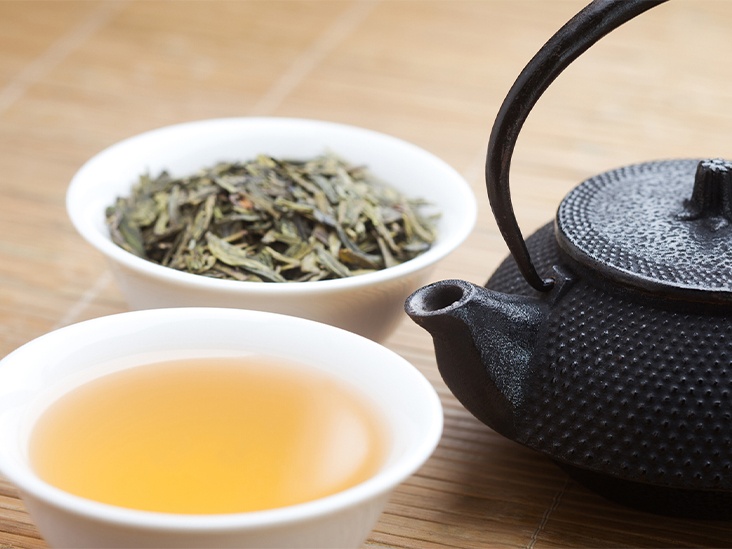Green tea is enriched in bioactive compounds having potential beneficial effects on health.
Green tea is produced by briefly steaming the harvested leaves, which brings softness to the leaves and prevents the fermentation or color change. The leaves are rolled, spread out and dried with hot air or pan-fried at work stations that turn tea leaves crisp. The resulting greenish-yellow tea has a green, astringent flavor. Green tea is rich in healthful polyphenols catechins (with anti-oxidant properties), called epigallocatechin-3-gallate (EGCG) responsible for health benefits linked to green tea.
A number of biochemical mechanisms including radical scavenging and antioxidant properties are postulated in clinical studies on the beneficial effects of green tea in chronic diseases. Green tea consumption exhibits anti-inflammatory (the property of a substance or treatment to reduce inflammation), anti-thrombogenic (a substance that induces and/or promotes the formation of a thrombus or clot), anti-proliferative (property of a substance to prevent or retard the spread of cells), vascular-protective effects, and lipid-lowering effects.
The potent antioxidant properties of epigallocatechin-3-gallate (EGCG) effectively trap reactive oxygen species, or free radicals, which are common culprits in aging and chronic degenerative diseases. Catechins present in Green tea are reported to regulate vascular tone (degree of constriction experienced by a blood vessel relative to its maximally dilated state.)
Green tea is used in preventive care for Crohn’s disease, Parkinson’s disease, diseases of the heart and blood vessels, diabetes, low blood pressure, chronic fatigue syndrome (CFS), dental cavities (caries), kidney stones, and skin damage. Green tea is reported to have a beneficially impact on parameters associated with cardiovascular dysfunction including lipoprotein oxidation, vascular inflammation, the proliferation of vascular smooth muscle cells, platelet aggregation, and vascular reactivity.
Green tea can provide a cure in preventing skin wrinkles and the symptoms of aging through anti-oxidant and anti-inflammatory activities. Green tea potentially acts as an antiviral and antibacterial agent. Green tea may help protect against bacterial and viral infections allergies, loss of brain cells, decreased bone mineral density, and arthritis. Green tea preparation helps improve immunity and prevents cold and flu symptoms. Tea leaves contain an amino acid Theanine, naturally present in its composition. L-theanine increases the activity of the inhibitory neurotransmitter GABA, associated with providing a relaxing effect, in battling depression.

Endothelial dysfunction (imbalance between vasodilating and vasoconstricting substances produced by the endothelium cells in the blood vessel) and constriction of blood vessels, reduces blood flow to the heart muscle and increase blood pressure. Inflammation of blood vessel walls and proliferation of the muscle cells within blood vessel walls, contribute to atherosclerosis. Abnormal platelet aggregation within blood vessels, can lead to a deadly heart attack or stroke. High levels of low-density lipoprotein (LDL), on oxidation, potentially increase complications.
Green tea and EGCG in lab studies have been shown to reduce atherosclerosis and improve arterial compliance and endothelial function.
Epigallocatechin gallate activates endothelial nitric oxide syntheses in cells lining blood vessels, or endothelial cells, that add to the cardiovascular benefits of green tea consumption. Increased release of nitric oxide causes smooth muscle within the blood vessel wall to relax, thereby increasing the diameter of the blood vessel and improving blood flow.
EGCG reduces the expression of cellular chemicals known as cytokines (category of small proteins (~5–20 kDa) that are important in cell signaling), that promote inflammation underlying atherosclerosis and heart disease. Epigallocatechin gallate inhibits inflammation and proliferation of smooth muscle cells within the blood vessel wall, preventing vascular blockage.

EGCG protects Cardiovascular Health. Green tea and EGCG scavenge damaging free radicals, or reactive oxygen species that cause cellular injury leading to heart disease. Regular green tea consumption is associated with a reduced risk of cardiovascular diseases such as stroke (blood supply to part of the brain is interrupted or severely reduced, depriving brain tissue of oxygen and food) and myocardial infarction (heart attack).
Green tea is a natural ACE inhibitor (angiotensin-converting-enzyme inhibitor). Several clinical studies indicate lowered blood pressure in animals and humans, given green tea extracts. Green tea increases the antioxidant capability of the blood, which protects the LDL cholesterol particles from oxidation, preventing heart disease. At the molecular level, EGCG directs cell signals that block harmful or dangerous activity that could lead to the uncontrolled growth characteristic of cancer cells. Green tea in lab studies has been shown to suppress tumor growth by blocking angiogenesis (formation of new blood vessels from an existing blood vessel), or the formation of new blood vessels supplying the tumor.The cancer-preventive effects of green tea may be partly explained by the interaction of EGCG with the cellular-control mechanism attributed to the 67-kDa laminin receptor.
Green tea also inhibits a growth factor receptor called HER2, which is present in excess in about 30% of breast cancers and is associated with poor outcomes. Through a cascade of intermediate signals, HER2 inhibition ultimately induces a protein that dramatically suppresses tumor growth. Green tea ingestion may help prevent or manage cancer in the breast, colon, mouth, pancreas, prostate, ovary, head and neck; heart and vascular disease, diabetes, obesity, Alzheimer’s disease & other neurological degenerative diseases; bacterial and viral infections, and other conditions. Some studies suggest that a regular intake of green tea (more than three cups daily) may reduce the risk of lung cancer in smokers.
EGCG regulates genes involved in fat oxidation and storage, as well as genes involved in insulin signaling and glucose metabolism. EGCG in lab studies has been shown to inhibit an enzyme that controls the rate of cholesterol production. Green tea consumption may reduce the incidence of type 2 diabetes and improve glucose control and insulin sensitivity.
Green tea in lab studies increased beta-oxidation (fat burning) in the liver by the action of catechins; linked to the reduction of intra-abdominal body fat. The continuous ingestion of green tea extracts reduces cholesterol levels, body fat and blood pressure in females and males without much change in their lifestyles.
The death of nerve cells in Alzheimer’s, Parkinson’s, or other degenerative brain diseases may be a result of a series of toxic reactions. These may include inflammation, the decline in protective neurochemicals, excess iron, and accumulation of harmful proteins–amyloid-beta (the biochemical indicator in Alzheimer’s disease). EGCG present in green tea interrupts this chain of toxic reactions. This bio-chemical event may potentially have preventive or therapeutic value in treatment therapy for Alzheimer’s disease and in Parkinson’s disease.
Green tea is helpful in reducing allergic reactions by blocking a key cell receptor involved in an allergic response. The compound methylated epigallocatechin gallate, in lab studies has shown to block the production of histamine and immunoglobulin E; that trigger and sustain allergic reactions.
Limitation of green tea includes the presence of caffeine content. Caffeine acts to block an inhibitory neurotransmitter Adenosine in the brain. This event increases the firing of neurons and the concentration of neurotransmitters like dopamine and norepinephrine in nerve impulses. People sensitive to caffeine should limit the intake of green tea to a healthy one cup a day. Green tea contains tannins that decrease the absorption of iron and folic acid in the digestive system.






